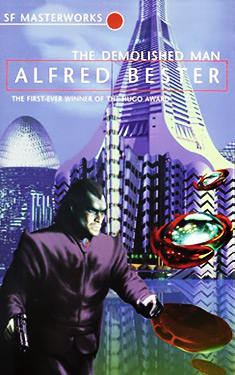1953 The Demolished Man
Alfred Bester
Read 2012, Reviewed 4/22/2013, Updated 9/17/2013
Rating: 3 stars
This was the first novel I read when I decided to read all
the Hugos. I had already read some winners,
but this book was the first one where I consciously had chosen to read the rest. This being the first, for some reason, I was
expecting the ultimate SF novel. I was rather
disappointed.
This book reflects the state of science fiction in the 50s. It is distributed by virtue of magazines,
because regular publishers weren't producing SF. So the stories had to be shorter, easily
divided between multiple issues, and therefore have enough action to make you
want to buy the next issue the finish the story.
It mixes the noir detective with the ESP or esper genre. It’s dark, fast-paced and engrossing, but unsatisfying. You know the bad guy’s gonna get caught, the
question is just how. And through most
of the book, I was waiting for something dramatic, but it never really
came.
There were two aspects which I did enjoy. First was the way Bester translated
communication between espers. Sometimes
I find playing with text formatting to convey meaning annoying, but here is was
fun. Second was the party the main
character attends to apprehend the killer.
At first I was put off by the party and the game of sardines. After finishing the book, I realized it made
me think of Poe’s Masque of the Red Death. Specifically, it was the description of the
house where the party was held, its rooms, and the macabre nature of the party
game.
In writing (and polishing) this review more than a year
after reading the book, I’ve noticed that the decadent party is a recurring
theme among the Hugos. I wonder if this
is an homage to Poe, or a reflection of the parties of the upper and/or
bohemian classes so often recreated in the films from and of the 50s and 60s. Perhaps it is a vision of the lifestyles of rich
and alternative people extrapolated beyond the decadence of the post-war era.
I’m going to stop here, because I've lost many of the
details of the book to time. I gave this
book three stars because I realize this was decent SF., especially for the
environment within which it was produced.

No comments:
Post a Comment